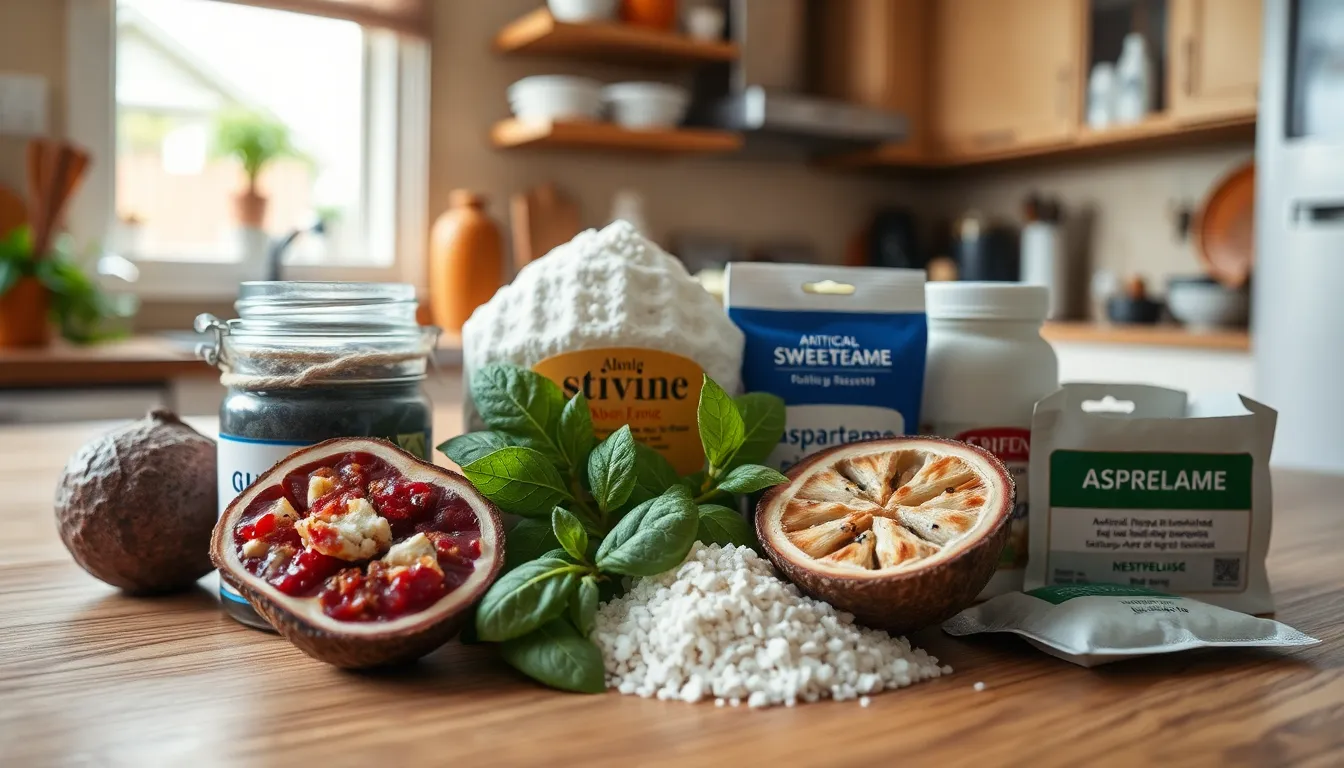In a world where sugar reigns supreme, many are on a quest for the holy grail of sweetness without the guilt. Enter sugar alternatives—the superheroes of the sweetening universe. These clever substitutes promise to satisfy cravings while keeping waistlines in check and energy levels stable. Who knew that saying goodbye to sugar could be this sweet?
From stevia to monk fruit, these alternatives are popping up like wildflowers in spring. They offer a range of flavors and benefits that can make anyone reconsider their relationship with the white stuff. So why not join the revolution? With a sprinkle of creativity and a dash of curiosity, it’s time to explore the delicious world of sugar alternatives and discover how they can transform meals from ordinary to extraordinary.
Table of Contents
ToggleOverview Of Sugar Alternatives
Sugar alternatives offer a range of options for those seeking to reduce sugar consumption. Popular choices include stevia, monk fruit, and erythritol, each providing unique flavors and benefits. Stevia, derived from the leaves of the Stevia rebaudiana plant, is intensely sweet and calorie-free. Monk fruit, also known as luo han guo, contains natural compounds called mogrosides that contribute to its sweetness without calories.
Erythritol, a sugar alcohol, contains about 70% of the sweetness of sugar. It contributes minimal calories and is not fully absorbed by the body, making it a popular choice for low-calorie diets. Other alternatives like xylitol and agave nectar provide different flavor profiles, catering to diverse tastes.
Ingredient labels often reflect the growing acceptance of these alternatives. For example, many food brands use stevia in beverages and snacks, highlighting its natural origin. Customers increasingly seek products with natural sweeteners, pushing manufacturers to innovate.
Health benefits associated with sugar alternatives also contribute to their appeal. Many options do not spike blood sugar levels, making them suitable for individuals with diabetes. They provide sweetness without the calories, supporting weight management goals.
Benefits extend beyond health; sugar alternatives enhance culinary experiences. Chefs incorporate these substitutes into desserts, marinades, and sauces, unlocking new flavor dimensions. Exploring these options encourages individuals to rethink their approach to sugar and its role in cooking and daily diets.
Types Of Sugar Alternatives

Sugar alternatives come in various forms, each with unique benefits and flavors. Understanding these options helps individuals choose the right substitute for their dietary needs.
Natural Sweeteners
Natural sweeteners derive from plants or fruits and are minimally processed. Stevia stands out due to its intense sweetness and lack of calories. Derived from the leaves of the Stevia rebaudiana plant, it offers benefits without affecting blood sugar levels. Monk fruit, another popular option, provides natural sweetness from its fruit extract while having zero calories. Agave nectar and honey are also considered natural alternatives, though they contain some calories and sugar content. These sweeteners allow for healthier options in cooking and baking, enhancing flavor without the drawback of traditional sugar.
Artificial Sweeteners
Artificial sweeteners are synthetic, designed to mimic sugar’s sweetness with minimal calories. Aspartame and sucralose rank among the most widely used, providing sweetness far greater than sugar. They contain no calories, making them popular for weight management. While some individuals may experience sensitivity to certain artificial sweeteners, they remain a staple for many seeking a sugar alternative. Saccharin, one of the oldest artificial sweeteners, has longevity in the market, yet it has faced scrutiny over health concerns. Despite mixed opinions, these sweeteners serve as viable options for those looking to decrease sugar intake.
Health Benefits
Sugar alternatives offer various health benefits that can enhance overall well-being. They promote healthier dietary choices while satisfying sweet cravings.
Lower Caloric Intake
Lower caloric intake is a key advantage of sugar alternatives. Stevia and monk fruit contain zero calories, making them ideal for weight-conscious individuals. Erythritol provides 0.2 calories per gram, significantly lower than sugar, which has about 4 calories per gram. This reduced caloric content helps with weight management without sacrificing flavor. Individuals aiming for healthier lifestyles can enjoy sweets without the added calories, creating a more balanced diet.
Dental Health Benefits
Dental health benefits accompany the use of sugar alternatives. Unlike sugar, sweeteners like stevia and erythritol do not contribute to tooth decay. These alternatives do not feed harmful bacteria in the mouth, reducing the risk of cavities and gum disease. Studies indicate that erythritol might even inhibit cavity-causing bacteria from growing. Prioritizing these sugar substitutes leads to better oral hygiene without compromising on taste.
Potential Risks And Side Effects
Sugar alternatives can pose certain risks and side effects that warrant attention. Understanding these factors is essential when incorporating them into a diet.
Allergic Reactions
Allergic reactions to sugar alternatives aren’t uncommon, particularly with natural sweeteners such as stevia and monk fruit. Some individuals may experience symptoms like itching, swelling, or gastrointestinal distress after consuming these alternatives. Reactions may vary in severity, so monitoring one’s body response is crucial. Those with known allergies to plants in the same family as stevia should exercise caution. While rare, severe reactions can occur, making it important to consult a healthcare provider if signs of an allergy appear.
Impact On Metabolism
The impact on metabolism varies among different sugar alternatives. Erythritol and other sugar alcohols are often better tolerated but may cause digestive discomfort in some people. Consuming these alternatives in excess can lead to bloating, gas, or diarrhea due to malabsorption in the intestines. On the other hand, certain artificial sweeteners, like aspartame, may affect gut health negatively. Research suggests that these sweeteners could alter metabolic processes or insulin response, although studies present mixed findings. Monitoring consumption and seeking balanced approaches to using sugar alternatives can help mitigate potential issues.
Choosing The Right Sugar Alternative
Selecting the right sugar alternative depends on individual preferences and dietary goals. Flavor profiles differ significantly among options, impacting overall enjoyment. Stevia offers a potent sweetness, while erythritol provides a milder taste with a hint of cooling. Monk fruit delivers natural sweetness without calories, making it an appealing choice for many.
Individuals concerned about calories might favor stevia or monk fruit due to their zero-calorie content. Erythritol, with its minimal caloric value of 0.2 calories per gram, serves as a suitable substitute for those looking to reduce caloric intake while still enjoying sweetness. Each option can enhance foods and beverages, allowing for creativity in meal preparation.
Reading ingredient labels can guide consumers toward healthier selections. Natural sweeteners often prevail in healthier food options, with brands increasingly incorporating them into products. The distinction between natural and artificial sweeteners remains crucial; natural options, like stevia, are less processed and often perceived as healthier.
Potential side effects warrant consideration when choosing a sugar alternative. Allergic reactions have been noted in some individuals using stevia or monk fruit, leading to symptoms such as itching and gastrointestinal distress. On the other hand, erythritol is generally well-tolerated, although excessive intake may result in digestive discomfort.
Lastly, consumer desires for digestive wellness highlight the importance of monitoring artificial sweeteners. Research findings remain mixed regarding their long-term effects on gut health. Prioritizing moderation can enhance experiences with sugar alternatives while yielding positive dietary outcomes.
Exploring sugar alternatives opens up a world of healthier choices for those looking to reduce sugar intake. With options like stevia, monk fruit, and erythritol, individuals can enjoy sweetness without the drawbacks of traditional sugar. These substitutes not only support weight management but also align with dietary needs, particularly for those managing blood sugar levels.
As more brands embrace natural sweeteners, it’s easier than ever to find products that fit into a balanced diet. By understanding the unique flavors and benefits of each alternative, individuals can enhance their culinary experiences. Adopting a mindful approach to consumption ensures that the transition to sugar alternatives is both enjoyable and beneficial for overall health.





